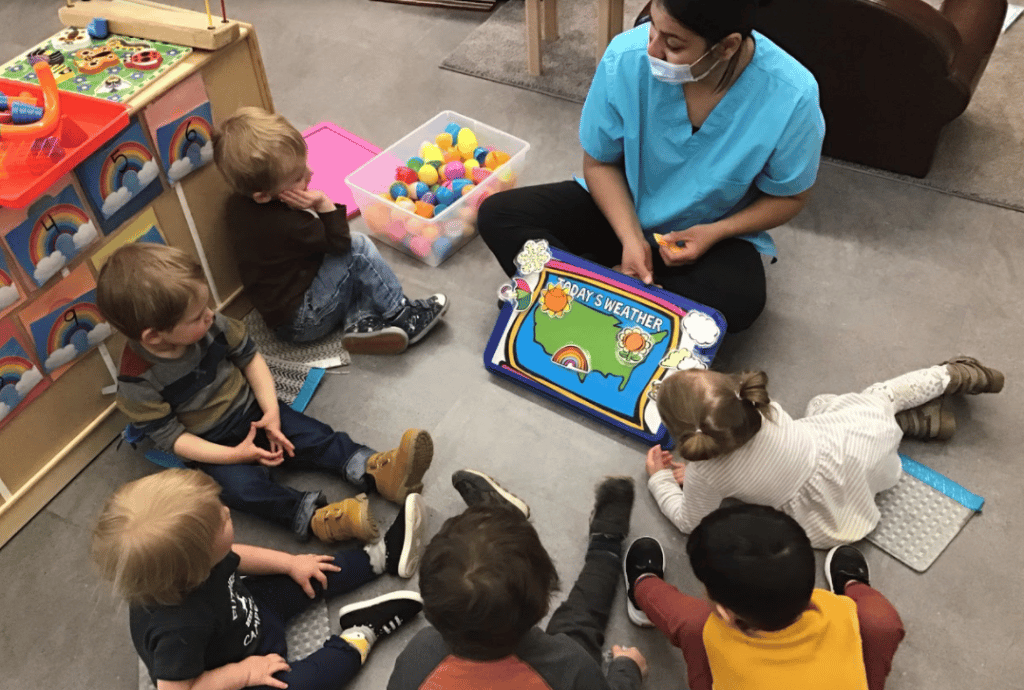The knowns, unknowns of how Universal Preschool will look in Eagle County
With the launch scheduled in Fall 2023, families can begin signing up Jan. 17

Vail Daily archive
Changes are coming this year to early childhood education as Colorado prepares to roll out Universal Preschool in the fall. While not completely “universal,” as the name might suggest, the program will provide tuition credits for all 4-year-olds (and some 3-year-olds) attending preschool across the state.
The program was initiated by a Colorado bill signed into law last April by Gov. Jared Polis. From April forward, the state — through the new Department of Early Childhood launched by this law — began the process of determining just how the program would work for providers and families.
According to a budget briefing, the state expects that this $335 million program will serve an estimated 30,000 4-year-olds in its first year, and even more in the future.
While Universal Preschool will launch across the state, the local rollouts of the program are being managed by 32 local coordinating organizations in various regions. In Eagle County, this role is being assumed in tandem by the Eagle County School District and Early Childhood Partners, an organization that supports local child care providers and families through programming.
“To do this locally was a really intentional, well-thought-out partnership. Knowing that we really believed between our organizations, we covered kind of all of the nooks and crannies of our community,” said Liz Costaldo, Early Childhood Partner’s director of operations.

Support Local Journalism
Costaldo added that the school district has a large early childhood program (with seven sites) and her organization has supported the community’s private providers (around 80% of those in Eagle County) and families since 2003.
El Jebel and Basalt are the only Eagle County municipalities that will be supported by another local coordinating organization. These two municipalities will be wrapped into the organization for Garfield, Lake and Pitkin counties.
Application for providers to participate in Universal Preschool opened in December. So far, according to Costaldo, only two Eagle County private providers (in addition to the school district) have signed on “with many, many more expected.”
“Like anything else that’s new, it’s a leap,” Costaldo said. “We’re definitely hearing mostly a mix of excitement for the families and for the programs and a bit of nervousness about bringing on a new program.”
What families should know
The next significant date in the program’s rollout is Tuesday, Jan. 17. On this date, families will be able to submit applications for the 2023-24 school year. These applications will be available on the Colorado Department of Early Childhood website.
All families with children that turn four before Oct. 1, 2023, will be eligible to receive tuition credits for 15 to 20 hours of care. These credits will only be available during nine months of the year, running on a similar schedule to the K-12 school year.
Some students may qualify for additional hours (up to full-day care totaling 30 hours) if they qualify based on certain “high-risk” factors. These factors include being a dual-language learner, a recipient of special education services, a low-income family (defined as at or below 270% of poverty), in the custody of foster care, or identify as homeless.
Some 3-year-olds will also be eligible for 10 hours of preschool services. Only 3-year-olds that have a family income under 270% of the federal poverty level or meet at least one of the above qualifying factors will meet this eligibility.
Shelley Smith, the school district’s director of Early Childhood Education, said that the most common misconception from families is that the number of hours they need care for is not limited by what they qualify for. No matter how many hours they qualify for, “they still can access full-day services,” she said.
Additionally, families can layer this financial assistance with the existing early childhood assistance.
“UPK Colorado eligibility is independent of a child’s eligibility for CCCAP, Head Start, or local preschool program funding, so families may layer these hours on top of their UPK allocation,” reads a fact sheet from the Department of Early Childhood.
Costaldo described the application for families as “intentionally simple,” adding that it will not be a time-consuming process and only collects the necessary information.
Once families complete the application, they will be matched to preschool spots available from the providers that have signed up to participate in the Universal Preschool program. As Smith and Costaldo described it, these matches will be weighted based on a variety of factors.
These factors include weighting the provider’s specific arrangements (including specific employer-based situations), sibling enrollment in certain programs as well as continuity of care. The latter of which, Costaldo said many providers are pleased to see.
“Most of our private child care programs serve from infant through preschool. So many of the UPK-eligible children have already been in the center for one, two, three years,” she said. “There is a sentiment that we want to prioritize existing enrollment to honor that continuity of care that’s so important for children’s development in terms of consistency with caregivers.”
Overall, the match process is “really pushing for parental choice about where they go,” Smith said. The only exception, she added, is for students with individualized education plans and special education needs, as only the school district programs are currently able to provide these services in the county.
As Jan. 17 approaches, Costaldo said they want as many families as possible — existing and incoming — to sign up as soon as possible.
“We just really want to have a robust community effort to get families to put in this application and to sign up,” she said.
Tuition credits

Eagle County School District/Courtesy Photo
When the Universal Preschool program was first passed into law, one of the biggest questions was around how much the tuition credits would be as well as how and when they’d be allocated. And in the fall, the state released this information.
For the first year, providers will receive funding from the state based on the number of children it expects to enroll in Universal Preschool. This per-pupil funding amount will be adjusted throughout the year based on the actual enrollment. This money will then go back to families as a way of a tuition credit on their tuition statements.
Providers will receive these payments on a quarterly basis and will apply the credits to families on whatever the program’s payment schedule is.
Statewide providers will receive, on average, $4,834 for preschoolers attending 10 hours a week; $6,040 for 15 hours a week; and $10,646 for 30 hours a week for the nine-month school year.
In Eagle County, Smith said that 4-year-olds, for the minimum 10 hours of credit, are estimated to receive $6,062 for that nine-month school year. A full-time family, she added, “can get a $10,762 tuition credit during the school year.”
For providers, this should not result in a loss of revenue, Smith said.
“This should provide programs with a more stable source of income as paid ahead of services and not based on attendance such as Colorado Child Care Assistance program,” she added.
Costaldo added that this is largely due to the fact that the state’s reimbursement rate is “pretty aligned with our average child care tuition rates.”
“We haven’t heard any concerns. In fact, we’ve heard a big sigh of relief,” Costaldo said. “(Many providers) are used to operating at a loss, and the state’s intention was to try to provide the tuition credit that would reflect the true cost of care.”
And in truth, this tuition relief for families is what the program is really all about.
“It will help to alleviate one monumental challenge, which is cost for families. Families will have some financial relief from the very significant burden of child care tuition, which is pretty much the same as in-state college tuition — or more — for most families,” Costaldo said.
“It could also provide access to families who might not otherwise be able to afford (preschool). There are some families that absolutely make too much money to qualify for a subsidy such as CCCAP, but not enough money to pay for tuition. This will give children an opportunity to attend preschool at least some days of the week.”
Alleviating and exacerbating early childhood dilemmas
There’s no doubt that Universal Preschool will solve this one significant challenge of the state’s early childhood system. However, there are still some concerns about how the program will impact the other challenges providers are facing.
The primary problem for early childcare providers being, like many other industries, workforce.
“There’s just not adequate staff,” Costaldo said. “We have multiple open positions in every program. Many programs are not operating at capacity because they can’t find teachers.”
Smith said the state is well aware that this challenge is “make or break” for the program.
“We have been assured that there is going to be funding focused on workforce challenges,” she added.
The Colorado Department of Early Childhood told 9News in December that its primary goal this year was to “recruit, retain, well-compensate, and support a diverse and qualified early childhood workforce to provide care and education to all children and their families.”
In the information provided to 9News, the department outlined several of its initiatives including providing two free courses for early childhood educators, $50 million in grants for providers’ efforts to recruit and retain, $21 million for recruitment and retention, a new early childhood educator income tax credit as well as other potential incentives.
For other communities, there has been some concern about not having enough slots for eligible families. However, Smith said, the local coordinating organization is “not anticipating that in Eagle County,” based on current and historic preschool and kindergarten enrollment in the community’s programs.
There is a question, however, as to whether or not the existence of Universal Preschool will create an increased demand for local preschool services.
“That is the unknown,” Smith said. “We would hope that many children in unlicensed care would now enroll but with factors such as lack of transportation, fear of government subsidies, we can’t be sure.”
Looming questions
That said, while the Early Childhood Department has released a lot of information as to what Universal Preschool will look like, there are a few remaining questions that providers are waiting for the state to answer.
The primary one, Smith said, is what the program’s quality standards will look like and how the state will support programs to get there. Costaldo said these are expected in the spring and will bring with it certain standards and curriculum requirements for providers.
“What we do know is the state has assured us that while the intent is for every student to be in a high-quality environment, they also want maximum participation,” she said. “So we don’t anticipate any sort of aggressive or unrealistic quality standards to come through. We know that there will be time in order to implement.”
Costaldo added that these standards are somewhat expected to be “basic, understood quality standards,” which most Eagle County providers will already meet.
As for other questions, only time will tell how Universal Preschool impacts local programs and families.
“In the long run, obviously when there’s this much time and attention and funding being allocated, it’s all of our responsibilities to make sure it’s used well and focused on the families and children,” Smith said. “Any time you build a system at the state level there’s unintended consequences that we’ll have to navigate, but we’re trying to be mindful of those.”
As the local coordinating organization, both Early Childhood Partners and the Eagle County School District are available to answer any provider and family questions.
In order to support this, the coordinating organization — as well as its advisory board made up of many local stakeholders — is working to build a website called the “Eagle County Early Childhood Hub,” Smith said. The idea being the hub will be a platform for answers on all things early childhood. Early Childhood Partners has a number of existing child care and family support services and resources as well.
“Our goal with Early Childhood Partners and the school district as the local coordinating organization is to make sure children, families and providers have a positive experience with this initial year, because that will make or break the program,” Smith said.
To learn more about Universal Preschool, visit CDEC.Colorado.gov/Colorado-Universal-Preschool.











